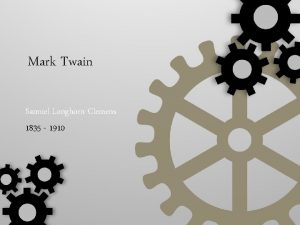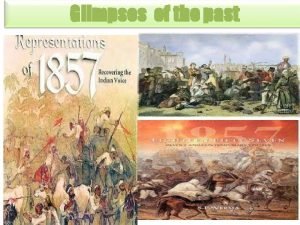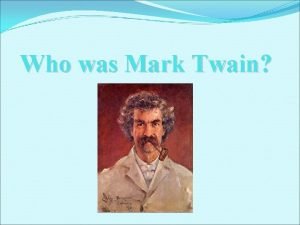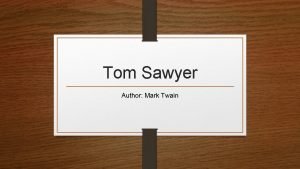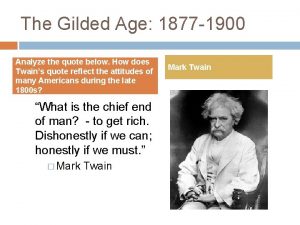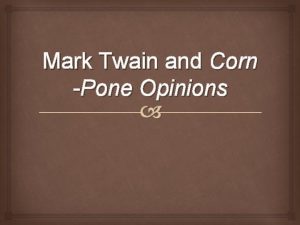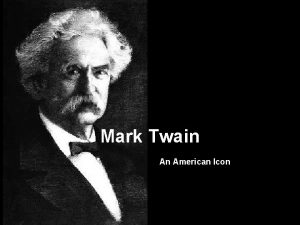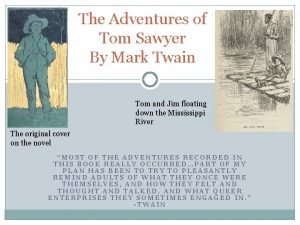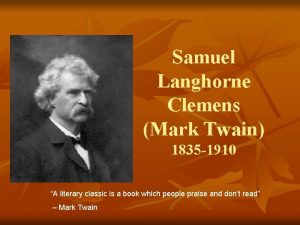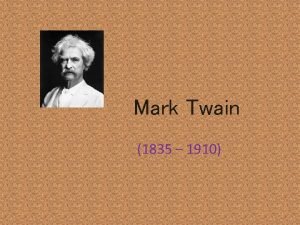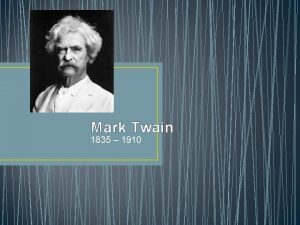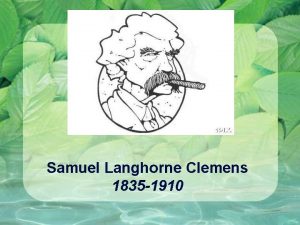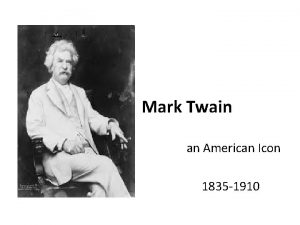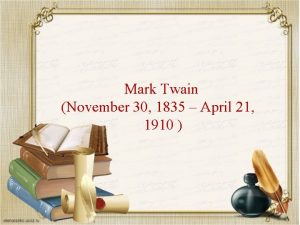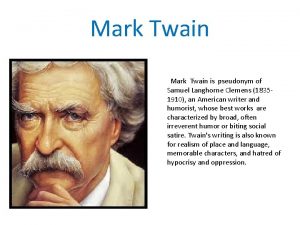Mark Twain Samuel Longhorn Clemens 1835 1910 Lesson



















- Slides: 19

Mark Twain Samuel Longhorn Clemens 1835 - 1910

Lesson Focus • Determine the qualities of a good narrative • Determine period-specific vocabulary

His Life • Clemens was born in Missouri • His work is some of the most famous produced in America • He was a humorist and satirist

• Twain was born shortly after a visit by Halley's Comet, and he predicted that he would "go out with it", too • He died the day after the comet returned • He was lauded as the "greatest American humorist of his age“ • William Faulkner called Twain "the father of American literature"

• After Samuel’s father died, Samuel became a printer’s apprentice • He was self-educated, and traveled throughout the United States much of his life • Clemens learned to pilot a riverboat on the Mississippi River; his pen name comes from riverboat “jargon”

• Clemens left the River at the beginning of the Civil War (river travel was difficult) • He moved west, writing as he went • A newspaper picked him up and he traveled in Europe and America, becoming more-known • It was during this period that he began using his pen name of Mark Twain

• Clemens had financial difficulties because of bad business investments • He finally found good council, repaid his debts, and was able to settle into married life • He married Olivia Langdon in 1870

• Olivia introduced Samuel to new ideas, including women’s rights • He also met influential people through his wife, among them Harriet Beecher Stowe • Clemens and his growing family continued traveling, and he continued making poor investments • In general, however, his life was good; he was writing well-received material, and his wife blessed him with three daughters and a son, although the son died as a child

• Samuel’s life changed dramatically after the death of one of his daughters • Within a few years, another daughter and his wife also died • Going through a deep depression, Clemens’ work became darker • He still cared deeply for his last daughter and his friends, often helping in their financial need

• Clemens died of a heart attack in 1910 • He is buried in Elmira, New York

His Work • Clemens is known as one of the finest American writers • His body of work includes both fiction and nonfiction • He is most famous for his novels, “The Adventures of Tom Sawyer, ” and “The Adventures of Huckleberry Finn”

• Clemens’ use of dialect is particularly remarkable; his works preserve some of the unique language of the people of the time in which he lived • Samuel was particularly annoyed with people who were arrogant; his satire could be scathing • He was also a strong supporter of a democratic government; he was strongly anti-imperialist • He also supported the abolition of slavery and supported women’s rights

Literary Terms • Humor - A comic, absurd, or incongruous quality causing amusement • Satire – A literary work that mocks or ridicules the stupidity or vices of individuals, groups, institutions, or society in general • Hyperbole – Saying more than what is true, usually for humor or for emphasis • Tone - The attitude a writer takes toward the subject or the reader of a work of literature

Discussion • What makes a “good narrative”? – Narrative - a story or account of events, experiences, or the like, whether true or fictitious • Plot • Setting • Characters “Hook” Dialogue Point of view

The Danger of Lying In Bed, page 507

Class Work • • Read the essay Identify elements of exaggeration (hyperbole) Literary Critique Questions, page 511, #s 1 -5 Summarize statistics used in the text

A Night of Terror, page 512

Class Work • Read the essay • Identify period-specific vocabulary • Literary Critique Questions, page 516 - 517, #s 1 -6

Homework • Writing Workshop, page 511, #2: Modified – Instead of creating an entire essay, use the statistics you uncover to create a minimum of 3 charts to be used in MLA format. It should include proper citations and be emailed to Mrs. Golden. – For homework, complete your research. We will discuss how to create the charts in class. – This will be a quiz grade…
 Samuel longhorn clemens
Samuel longhorn clemens My papa mark twain by susy clemens
My papa mark twain by susy clemens Historischer hintergrund romantik
Historischer hintergrund romantik Dissatisfaction (1835-56)
Dissatisfaction (1835-56) The romanticism (1795 — 1835) what is romanticism
The romanticism (1795 — 1835) what is romanticism What was mark twains real name
What was mark twains real name Mark twain realismus
Mark twain realismus Mark twain's real name
Mark twain's real name Gilded age quote
Gilded age quote Mark twain realismus
Mark twain realismus Father of american literature
Father of american literature Corn pone opinions summary
Corn pone opinions summary Mark twain icon
Mark twain icon American author and humorist
American author and humorist Mark twain is a famous american writer
Mark twain is a famous american writer At the funeral mark twain analysis
At the funeral mark twain analysis Mark twain irony
Mark twain irony Mark twain
Mark twain Mark twain adulthood
Mark twain adulthood Mark twain reveals stage fright
Mark twain reveals stage fright
